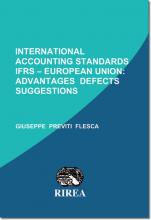
The creation and application of proper accounting principles for businesses of any size [from the ultra-complex group to a microenterprise] is addressed in this work through the business auditor point of view, that is, the business expert who deeply knows and can correctly apply all the rules of a sound management of the company and has a true and fair view of its reality and, therefore, knows and can do everything that an entrepreneur should do if he had the expertise and time.
This means that we are in the unique field of auditing understood in the broadest sense of the science of management of production entities of economic goods and/or services unlike other administrative reviews with different and more limited contents as the fiscal or financial statements ones or those dealing with specific aspects and elements such as a specific account or a specific contract, etc., and, therefore, it is very clear that we properly remain in the management field but without any claim and full of fear even to invade others' fields (technical reviews in the vast field of engineering for engines, aircrafts, ships, buildings, etc. or reviews in the legal field such as civil and criminal litigation, etc.), which also deal with full legitimacy of reviews. In the above mentioned scope, the value of economic goods is, perhaps, the most sensitive topic, due to many implications that characterise itself and which are not only technical nor only economic but also psychological, subjective, collective, regulated; that is, in other words, the creation and application of accounting principles is both science and art that must be harmonized by the auditor to reach a fair and convincing result to the generality of economic actors.
The field of attributing book values of economic goods has always involved engineers and economists (general and business ones) but often the competences of these professionals are not sufficiently integrated so that it is necessary that those who deal with estimates perform efforts to acquire and master the complementary concepts of which they are lacking, with dedication and humility [lawyers, engineers and the like].
Giuseppe Previti Flesca, engineer testing public works, accountant and auditor, is a retired business expert in the field of economic administration, having been awarded a gold medal at the LUISS, where he held the first Italian chair of auditing. Since 1951, when, still a student, he acquired a two-year-experience as " construction site assistant", he acquitted (1956/57) military service in the military Aeronautics as engineer; he was then for a little over a year (1957/58) engineer responsible for the maintenance of an important paper mill with two plants operating in the Rome area of Tivoli and, for over two years (1958/60), deputy chief engineer for the Technical Department at Enpas, with the task of coordinating and / or managing complex construction works for hundreds of billions of Italian liras at that time. For six years (1969/76) chief executive for services of a holding company [merchant bank] with the task of director or statutory auditor in more than 40 subsidiaries, and for fourteen years (1976/89) Director and CEO at the Società Italiana di Revisioni Aziendali (more than 5000 companies audited). He has always performed at the same time, since 1956 to today, the professional services both as a designer and director of works (civil, industrial, hydraulic, etc.), as a management consultant (especially with regard to the aspects of economics, accounting, finance and business organization in a turbulent environment and under inflation, in Italy and abroad), and has performed numerous corporate audit engagements (about 1,500) aimed at quantifying the credit (ordinary and special) on behalf of some of the most prestigious institutions and / or national banks, both regarding diagnosis and subsequent full company prognosis and treatment, and finally, the selection of investments. In the last six years he’s been working as a volunteer under the aegis of the UN in developing countries.
No doubt he can be qualified as an Italian expert in the value field: with its first business audit in 1958 he is now the most senior corporate auditor in Italy.


